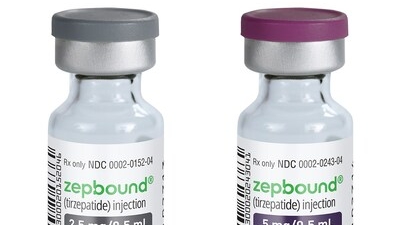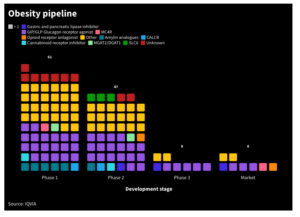
UK first country in Europe to reimburse tirzepatide
The British NICE has defined the conditions for the reimbursement of Eli Lilly's obesity blockbuster tirzepatide. This makes the UK the first country in which patients do not have to pay for the drug out of their own pocket.
A day after Eli Lilly Inc. published the results of a head-to-head comparison study between Novo Nordisk’s rival weight loss product semaglutide and its obesity drug tirzepatide, the UK’s National Institute for Healthcare Excellence (NICE) has announced the conditions for reimbursement of Lilly’s obesity blockbuster tirzepatide. This makes the UK the first country to provide reimbursement for the treatment of obesity in the next three years. In Germany and other EU countries, Lilly’s dual GLP1/GIP receptor agonist and Novo Nordisk’s GLP1 receptor agonist must be paid by patients on their own.
According to the data presented by Eli Lilly from the SURMOUNT-5 study involving 700 patients, tirzepatide resulted in 47% greater weight loss after 18 months of treatment (25 kg vs 16.5 kg) alongside a reduced-calorie diet and increased physical activity compared to semaglutide. NICE uses this as justification for only wanting to reimburse tirzepatide. However, contrary to the marketing authorisation, which provides for treatment of patients with BMI over 30, NICE has determined that treatment of patients with BMI≥35 and at least one comorbidity brings the most benefit. As the eligible patient population in the UK is high, reimbursement is also subject to conditions, such as achieving weight loss within a certain period of time.
“As the reimbursement accounts for a very large number of people, around 3.4 million in England, the roll out of tirzepatide has to be carefully managed to ensure healthcare professionals can continue to meet the full range of health needs of all their patients,” writes NICE in its guidelines. “Initially, only those with the highest clinical need will be prioritised to receive the medication while the NHS tests a variety of new services to care for people living with obesity.”
Following a consultation held in October on NHS England’s request to roll out the medication over 12 years, NICE has published its guidance on the way forward. This includes prioritising people who are already receiving care in specialist weight management services who will be able to access tirzepatide within 90 days of NICE’s final guidance being published if clinically eligible. NHS England will develop a plan detailing which other groups of patients will be offered tirzepatide in the next 3 years.
The licence for tirzepatide lists examples of weight related illnesses for which the drug should be considered such as hypertension, dyslipidaemia, obstructive sleep apnoea, cardiovascular disease, prediabetes, or type 2 diabetes.
NHS England plan to publish their interim commissioning guidance early next year, and those patients with the highest clinical need, outside of specialist weight management services, will start to be offered tirzepatide from 180 days after NICE final guidance is published. In total around 220,000 people are expected to benefit in this initial three year roll out period.
During this time evidence will be generated to understand the most effective forms of care, and this will inform a NICE re-evaluation of the remaining roll out period to the wider group of eligible patients.
According to NICE, tirzepatide (also known as Mounjaro, made by Eli Lilly) has been shown in clinical trials to be more effective than diet and exercise support alone, and when compared with semaglutide alongside diet and exercise support. The medicine could be offered in either primary or secondary care, with appropriate support focused on diet and nutrition, behavioural and lifestyle elements, physical activity and where appropriate mental wellbeing.
An independent NICE committee recommended the self-administered weekly injection, costing £122 for four kwikpens at its maximum 15mg dose list price, for people living with obesity in draft guidance issued in June. It is estimated that the medicine and associated wraparound care services will cost the NHS in England around £317.2m per year by the third year of implementation. However, as the drug landscape is changing rapidly, NICE and the NHS will monitor developments in the next three years.
Despite the considerable cost, the evidence presented to the NICE committee suggests this medicine is a cost-effective use of NHS resources for some patients. When people with obesity who already have weight-related illness lose weight, it reduces their risk of developing further health complications due to their obesity. This prevents future ill health and saves money for the NHS that can then be reinvested in other services.
According to the Health Survey for England 2022, around 64% of adults are either overweight or living with obesity in England. Obesity is the second most common cause of preventable death after smoking.
If no appeals are lodged during the next two weeks, NICE expects to publish final guidance on Monday 23 December 2024. The first NHS patients will then be able to start receiving the medicine after 90 days if they are already being looked after in specialist weight management services, or 180 days if they have the highest clinical priority. Guidance on service delivery and clinical priority is planned to be published by NHS England early next year.


 IQVIA
IQVIA
 Momoneymoproblemz - wikimedia
Momoneymoproblemz - wikimedia